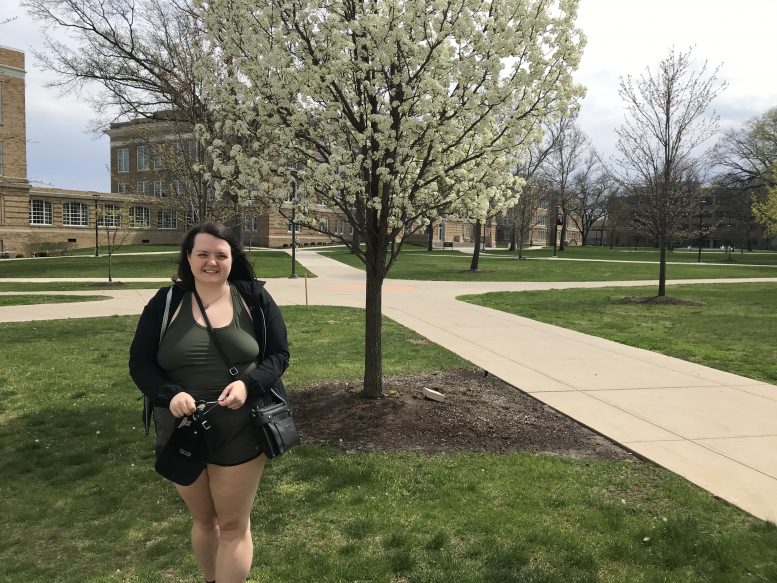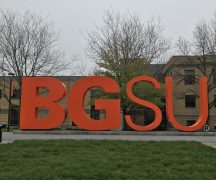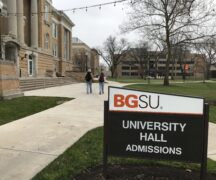By DAVID DUPONT
BG Independent News
Bowling Green State University student Ashley Lytle is pushing for change that won’t help her. The junior majoring in social work wants the definition of independence on the FAFSA – the Free Application For Federal Student Aid – to be changed to allow self-sufficient students under 25 to considered on their own.
As it stands those students, except in a few circumstances, must rely on their parents’ financial information, even if their parents do not support them, even if their parents refuse to fill out the form, even if they are estranged from their off-spring. This can be a particular problem for some LBGTQ students.
Lytle has launched a petition on change.org advocating to have the U.S. Department of Education, which administers the FAFSA ,to change the definition.
She knows that the change will take time and will not be accomplished before she graduates in a year, a fifth year of school where she will get no financial aid.
“This won’t affect me. But I think about my younger cousins, my friends’ children and my future children. I don’t want them to be in a position where they have to choose whether they can go to school or not. Based off if they are going to qualify for aid. I want them to have the opportunity.”
In a recent letter to the editor, she explains the problem: “The Free Application For Federal Student Aid (FAFSA) is meant as a tool for students to be able to afford tuition at their prospective schools after high school. But unless you fall into an extenuating category, the FAFSA application requires you to provide your parents or guardians tax information for the previous year. It does not matter if the student pays most or even all their own bills. Their financial aid fate is determined by their parents or guardians.”
Lytle’s campaign started with an assignment in a social work policy class. The instructor Tonya Camden required students to take on an advocacy project. It could be as simple as writing a letter to an agency or office holder.
“She asked us to take on something we cared about,” Lytle said. “If I’m going to do that, I’m going all in. So I started the petition. And I’m not going to stop it when the class ends. … I’m going to keep pushing.”
Lytle is advocating for FAFSA to use the same definition as the IRS uses to determine whether someone can be claimed as a dependent. If a taxpayer is responsible for more the half of another person’s support, they are a dependent.
“It would make sense to use tax definition,” she said.
The petition was launched to “start a conversation” about the issue.
She’s heard from fellow students about their problems, or those of people they know. One woman had to forego college because her parents refused to fill out the FAFSA, and she wasn’t in the military, homeless, or had a child.
Another ended up in debt because she had to borrow instead of getting scholarships.
Lytle came to Bowling Green from Portland, Oregon where she grew up. Her parents are unable to support her, so she has worked throughout her time to stay in school. She has been able to secure some scholarships from the university, but those will be gone as she enters her fifth year.
Lytle changed her major from journalism to social work. She “wanted to make a more hands-on impact on my community.” Still the change requires her to stay two more semesters to complete her undergraduate degree
As she considered colleges, she knew she wanted to expand her horizons, live somewhere new and meet new people. She happened upon BGSU on a college search website. In the section about school traditions, BGSU mentioned its ghost stories. Lytle was hooked. She determined “it must be a very unique campus with a fun, welcoming atmosphere” because “it’s proud to talk about its history and quirks.”
That’s proved to be true. She’s enjoyed her time here.
Having grown up in a city, she likes that Bowling Green is in a small town. It’s easier to stay focused on her work here.
She plans to stay around for a few years after her expected graduation in spring 2022, though beyond that graduate school may take her further afield.
Long-range she would like to do non-profit work to address homelessness. Having secure housing provides the foundation so people can address mental health, addiction, and employment issues, she said.
Lytle also wants to do research on the interactions between pets and social work.
She has three pets – two cats, Juniper and Luna, and dog, Winter. She knows how important they can be to someone’s well-being.
She’s also aware that with pets come responsibility, and that can pose problems for some people. “Some older people may put off medical care because they can’t find someone to watch their animals,” she said. Some people may be reluctant to leave an abusive relationship because of concern for their pets. And it can make finding housing more difficult.
For now, she’s focused on how to keep her campaign to make FAFSA more responsive to the needs of independent students going. She collecting names of government officials to contact about bringing the change about, if not for her, maybe for the next generation of students.




